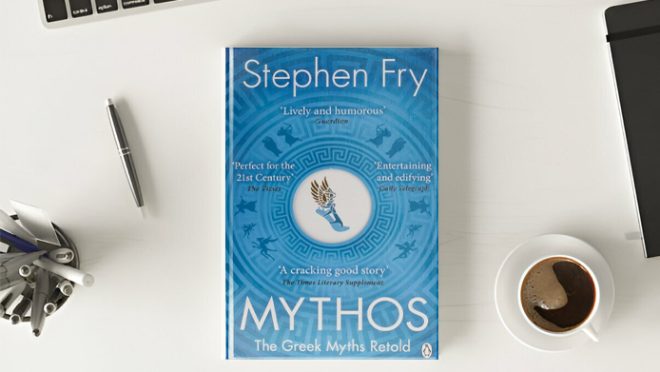Mythos and heroes: Greek myths retold by Stephen Fry
Mythos and heroes: Greek myths retold by Stephen Fry

Myth plays a significant role in shaping society and culture. The origin of myths and their implications can be a fun study, but perhaps nothing is as interesting as the myths themselves.
Greek mythology has plenty of stories and materials, but it is difficult to find a book that tells those stories in a comprehensible order. Stephen Fry’s great mythology series takes on that challenge and knocks it out of the park with the first two books – Mythos and Heroes.
The first book, Mythos is a retelling of selected Greek myths by the British author, and Fry does a mighty good job of it. His writing, as always, is smooth and easy to follow. But perhaps the best thing about Mythos is how Stephen Fry approached it and made sure everyone could read it. “You don’t need to know anything to read this book. There is absolutely nothing academic or intellectual about Greek mythology; it is addictive, entertaining, approachable, and astonishingly human.”—these were the exact words of the author.
Mythos starts from the beginning, where nothing existed but chaos. Then come the titans and the gods. And eventually other creations. The author tries to follow a linear timeline as much as possible, making it easier to follow the narrative. We come to know about Zeus and his very questionable adventures. Then we get to know the other gods and their jealousy towards mortals whenever someone is better at something. We meet Hades and his kingdom in the underworld, and countless other creatures that terrorised the earth.
In Mythos, the writing is smooth, the stories are eloquently told, and, as one can expect from Stephen Fry, the dialogues are often funny. Perhaps this little personal tweak from the author is what made it more enjoyable for the modern audience.
“Heroes: Mortals and Monsters, Quests, and Adventures” is a companion book to Mythos. Goodreads lists this book as the second book in Stephen Fry’s great mythology series. While the first book was focused on myth and stories in general, Heroes strictly focuses on mortals rather than gods. These stories are just as thrilling as the ones of the gods and, in some cases, even more interesting.
For example, The Labours of Hercules is still a story popular enough to get a movie. The story of Perseus has been retold in different versions over the years, but the essence remains the same. And Icarus, who flew too close to the sun, paid the price. Oedipus was a tragic hero who fulfilled a terrible prophecy that he tried so hard to avoid. Which is a recurring theme in Greek mythology. All these stories and much more are depicted in ‘Heroes’.
The mortal heroes had many challenges to overcome. They had to fight monsters, conquer lands, go on adventures, and do all that while making sure they did not enrage any gods. Because if there is one constant fact in Greek mythology, it’s this: The gods love to curse. And if you are cursed, then you will become an example for eons to come.
There are also the moral implications of what the heroes did and what should have been done. Quite justifiably, the flap of the book says, “There are Heroes – and then there are Greek Heroes.”
Just like Mythos, the author tries to tell the story in a linear timeline, and the dialogues are adapted for a modern audience. In addition, whenever there are an overwhelming number of characters, Fry extends a helping hand by reminding us who that character is and where we might know them from. There are also illustrations and photos that are relevant to the stories, and of course, references for anyone who wishes to read more or dive deeper into the interesting world of mythology.
Both of these books are highly recommended for anyone who is interested in Greek mythology or just looking for a good story. The books are over 400 pages long each, but it never feels like that. One could easily lose themselves in the smooth writing of Fry and the intensity of the stories.


